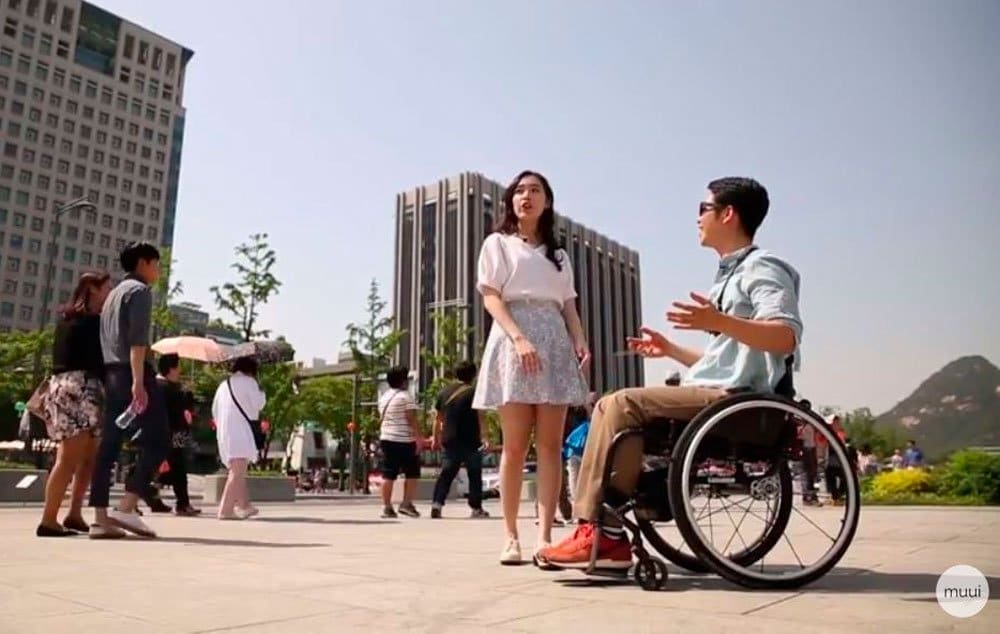Images of people with disabilities in film and TV can be all too rare. When they do appear, mainstream media often rely on disparaging tropes to frame them. How often is someone with physical disabilities depicted as an “inspiration,” overcoming obstacles and reminding the audience that their problems aren’t so bad after all? How often is disability depicted with pity and charity, simply garnering sympathy and tears? Muui, a Seoul-based nonprofit, is working to change the mainstream conversation around disability through creative productions. Their first project is an original travel series called Seoul, Take the Wheel.
The Project
Seoul, Take the Wheel is an English-language tour of South Korea’s capital city with a rotating cast of local residents joining the main host and creative director, Kunho Kim. Over the course of 10 mini-episodes, viewers will join residents in local hangout spots, popular restaurants, and Seoul’s most famous sites. The series presents a new point of view to visitors and residents alike, incorporating wheelchair accessibility information into a glimpse of some of the best that the city has to offer. From Gwangjang Market to karaoke rooms, Seoul, Take the Wheel is a fun, exciting look at what to expect when traveling around this bustling city.
In each episode, Kunho and friends show viewers a specific place in Seoul and highlight accessibility information with accompanying maps and graphics. A series designed for the Internet age, each episode clocks in at about five minutes, featuring a wide array of lush shots that showcase Seoul’s unique architecture, dynamic city life, and delicious food. Each episode is publicly available on YouTube and Facebook with English/Korean subtitles, so as to encourage more conversation and action around wheelchair travel.
The inspiration for this particular series comes from one very preventable issue that wheelchair users face whether they’re trying to travel abroad or in their own hometowns. From vaguely-worded building descriptions online to phone calls with hotel employees who may not fully know what true wheelchair accessibility entails, one major hurdle wheelchair travelers face is a lack of useful information. Drawing on his own experiences living and traveling in Seoul, Kim knows first-hand that accessibility-related information can be frustratingly difficult to find.
Though there are rules and regulations regarding wheelchair accessibility in Korea, many famous sites were built before such laws were put in place, some buildings fulfill the legal requirements without being wholly user-friendly, and other buildings just simply aren’t up to code. With a lack of attention paid to the daily experiences of wheelchair users, it can be difficult to find out ahead of time if a building, its entrances, and its bathrooms are truly accessible. So, Kim set out to create Seoul, Take the Wheel in order to help provide more useful accessibility information for locals and visitors alike. The group also hopes to raise awareness of the unnecessary obstacles wheelchair users may face in Seoul.
The Team
The creative director behind the series is Seoul native Kunho Kim, a 22 year-old Harvard College student and co-founder of the Korean nonprofit organization Muui. Kim grew up in Seoul, went to high school in Vietnam, and is currently finishing his bachelor’s degree in the US. He worked with an equally international team to bring this project to life: local film students, a translation team working between Korea, the US, and the UK, and resident co-hosts (some born and raised in Seoul, others who grew up in Vietnam or Scotland). The international nature of the team reflects the international goals of Muui itself, as well as its wider aims for future projects.
About Muui
Muui was formed in 2015 after a road trip taken by co-founders Kunho Kim and Brad Riew around the United States. They learned a lot from this experience and were motivated to increase access to useful information for wheelchair travelers. Throughout their travels together, they saw a link between the lack of accessibility information and the popular methods of depicting people with physical disabilities: the general public may not often see images of wheelchair users leading active lives, and thus they might not stop to consider how people of all mobility levels might make their way through public spaces. With this lack of thought about accessibility comes a lack of action, so Kim and Riew sought to form a group that could tackle these entangled problems all at once.
They formed a team with filmmakers, designers, and other creative individuals. They also secured advisors from the fields of medicine, art, and politics, and they connected with interested volunteers internationally to help their new group’s work reach Korean and English-speaking audiences.
Muui’s first few projects will focus on wheelchair travel to illustrate their message in a fun, exciting, and easily understandable way. The group hopes these travel projects will provide useful accessibility information while also appealing to viewers who might not necessarily be seeking out such information personally. The group’s hope is that Seoul, Take the Wheel will help increase awareness of accessibility-related issues while setting the stage for more of this exciting, first-of-its-kind work.
What’s Next:
The Muui team plans to create more video projects and expand their work into other media and interactive formats. They are developing plans to make more international city guides and are aiming to create projects with more audience involvement and user created content. The next release will be this November with 10 Days in Saigon, a more in-depth travel series directed by na independent filmmaker that experiments with a new format and digital map component.
Beyond travel guides, Muui aims to create future projects to draw attention to some of the less visible challenges people with disabilities can face. From legal protections to university bureaucracies, there are many more places to intervene and create a world that’s more accessible for everyone.
Source: Korea Stripes



